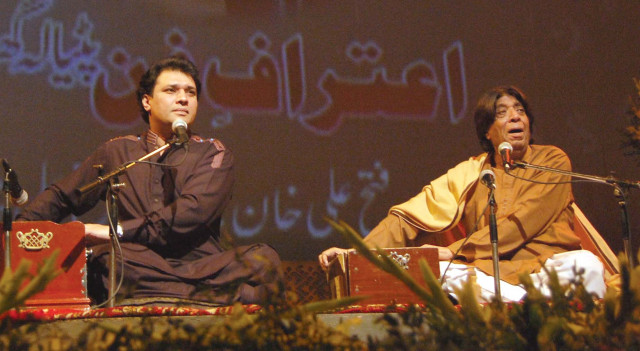A familiar voice drifting in the aisles
The legendary Ustad Fateh Ali Khan gives a heart-warming performance to a heart-filled auditorium.

The Pakistan National Council of the Arts (PNCA) gave such an opportunity to the denizens of Islamabad on Tuesday, by inviting the ustad and his son, Rustam Fateh Ali Khan, to pay tribute to the Patiala Gharana’s immense contribution to the sub-continent’s classical music heritage. Sadly, Islamabad did not care to think much of it.
Rose petals and floor cushions were strewn across the auditorium’s stage, flanked by six arched wooden windows and warmed by candlelight. The evening looked promising.
Upon entry, the ustad used the aid of a crutch and two men to make his way across the sparsely seated auditorium to the warmly set stage, amidst standing ovations and nostalgic stares. Despite his ailing condition, he was evidently in high spirits. But even though the evening was peppered with the ustad’s amusing one-liners and obvious disdain for what passes as music in popular culture these days, there was a poignant sadness in the air, as if one were plainly witnessing the death throes of a once celebrated art form.
Before beginning the performance, the ustad insisted upon keeping the auditorium’s lights on as he did not wish to feel like he was singing on a radio show, indirectly and perhaps unintentionally highlighting the stark contrast between the modern and classical ethos, where the intimate interaction between a performer and his audience is maintained with eye contact at all times. His son Rustam, a worthy heir in the ustad’s own words, encouraged the audience to take pride in Pakistan’s art and stressed the importance of exporting a ‘soft image’ to the world. He reminded the audience that “those nations that celebrate their heroes’ achievements are the nations that are eventually successful.”
The first performance by the duo and their troupe was Bhageshari Raag, a raag of Sufi origins. The rhythm, though mesmerizing, was atypical for a listener acquainted only with the movements of modern pop songs. However, it set the tone well for the remainder of the evening. The ustad’s freely flowing vocals were matched perfectly by the sarangi and Rustam’s counters, while James Khan’s fingers performed hypnotic acrobats on the tabla. Warning that others may be tuning-in to the sub-continent’s classical music more than Pakistanis, Rustam told the audience to “beware of the time when Ricky Martin starts singing Qawwalli.”
For the second performance, an audience member requested that the ustad and his son sing Raag Aymen, to which they happily complied. The third performance was a rendition of ‘kaddi a mil savan yaar’, followed by another light song. The final performance of the evening, arguably the show stealer, was ‘pyar nahin sur se jis ko’, which captured beautifully the core message of the evening -- to let the musician and his art flourish and be appreciated. The ustad ended the evening with the words “keep listening, keep listening.”
Ghazala Minallah, a well known rights activist, stressed the importance of promoting and encouraging our heritage which we could not afford to lose at this juncture. “It is the only thing keeping us sane,” she said, her words sounding rather ironic in a poorly attended auditorium that was not even filled to half capacity.
In a brief conversation with The Express Tribune, Rustam candidly expressed his scorn at the increasingly bigoted mindset of Pakistani society and said that he felt more comfortable performing in other countries where he received more appreciation. Even though he gave a stellar performance, he said he was not able to fully exhibit his vocal skill because he could clearly see from many of the audience members’ expressions that they did not understand classical music and may even have laughed at him. He said that the chief reason for this lack of understanding stemmed from his countrymen’s refusal to “own their art”, prompted by extreme interpretations of religion, in his view.
When asked about his views on government efforts to promote classical music, he said the present minister of culture, who was also the chief guest of the evening, was better than his predecessors. He said, in the past, totally unqualified people with little or no appreciation for art of culture occupied the ministerial post, the logic of which he failed to see.
Despite the dispiriting note upon which the evening concluded, it was certainly infused with a certain sense of serene transcendence that cannot be accurately described in words. However, one could not help but feel that perhaps the ustad’s own ailing condition personifies the condition of his cherished art. Let us hope that is not the case.
Published in The Express Tribune, February 10th, 2011.



















COMMENTS
Comments are moderated and generally will be posted if they are on-topic and not abusive.
For more information, please see our Comments FAQ